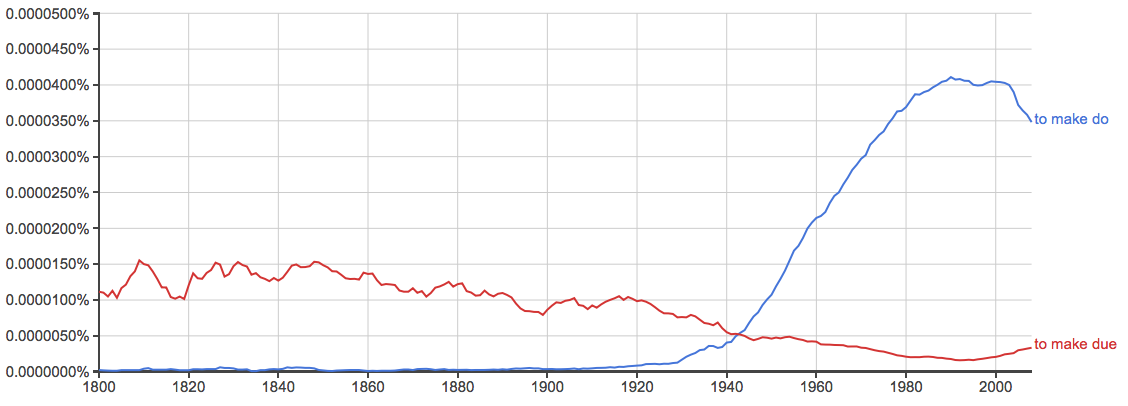When plans go awry, sometimes we are forced to make the best of it, even if the circumstances are less than perfect. Giving up is usually not an option, and when it is an option, it is probably not the best option.
Carrying through even when things go wrong is something we all have to do, and in English, there are several ways to describe this unfortunate situation. One of the simplest is to make do.
Both make do and an alternative form of this phrase, make due, have appeared in print over the past 200 years or so, but only one is correct in Modern English. Is it make do or make due?
Continue reading to find out.
What is the Difference Between Make Do and Make Due?
In this article, I will compare make do vs. make due. I will use each of these words in some example sentences, so you can see how they appear in context.
Plus, I will show you a mnemonic device that helps when choosing either make due or make do.
When to Use Make Do
 What does make do mean? Make do is an idiom. Grammatically, it is a verb phrase, and it means to use what one has on hand or to persevere through non-ideal circumstances.
What does make do mean? Make do is an idiom. Grammatically, it is a verb phrase, and it means to use what one has on hand or to persevere through non-ideal circumstances.
For example,
- “We’ve lost a lot of supplies, but we’ll make do with what we have,” said the Sherpa.
- The team will have to make do without its star player while he recovers from an injury.
- The couple and their two sets of twins — the older twins are 7 and the younger are 20 months — have had to make do with about $450 less per month. –The New York Times
The word make in make do also gets conjugated into different tenses. It follows the same rules as make alone.
Check out some of the conjugations below,
- I/we make do: First person singular/plural present
- You make do: Second person singular/plural present
- He/she/it makes do: Third person singular present
- They make do: Third person plural present
- Making do: present participle
- Made do: simple past
When to Use Make Due
 What does make due mean? In Modern English, the variant make due is considered a spelling error. Interestingly enough, however, it was actually more common until roughly the 1940s, but, today, it is considered substandard.
What does make due mean? In Modern English, the variant make due is considered a spelling error. Interestingly enough, however, it was actually more common until roughly the 1940s, but, today, it is considered substandard.
In the 21st century, make do is the predominant version of this phrase in published works.
The chart below visualizes the trend of make due vs. make do over time,

It only looks at books written in English since the dawn of the 19th century, but it is still clear enough to show that modern writers greatly prefer make do.
Trick to Remember the Difference
 Today, make do is the only standard variation of this phrase. Make due is a historical form that, although popular in the 19th and early 20th centuries, is no longer used.
Today, make do is the only standard variation of this phrase. Make due is a historical form that, although popular in the 19th and early 20th centuries, is no longer used.
Since do is a verb that means perform an action, and making do is performing an action using available resources, use the meaning of the word do to remind yourself that make do is the standard version of this phrase.
Summary
Is it make do or make due? Make do is a verb phrase that means to use what’s available in non-ideal circumstances.
- Make do is the correct spelling.
- Make due is a historical variant that is no longer accepted.
Contents
